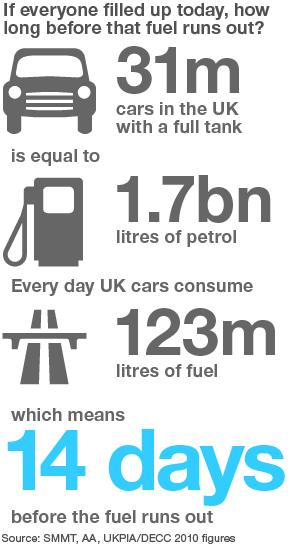Fuel strike threat: 'Panic buying' at petrol stations
- Published
- comments
Queues have formed at petrol stations as demand for fuel shot up after ministers called for people to top up in case of a tanker drivers' strike.
Some garages ran dry but retailers said they were coping and normal deliveries would ensure supplies were replenished.
Ministers have rejected retailer claims their advice caused "panic buying".
Conciliation service Acas says it hopes talks will take place shortly after Monday, making Easter strikes unlikely, correspondents say.
Some 90% of UK forecourts are supplied by the Unite union's 2,000 or so members, who are calling for minimum standards of working conditions and pay.
Anticipating a strike they describe as "completely wrong", ministers had called for motorists to keep their cars "topped up" but urged people not to queue.
On Thursday, Energy Secretary Ed Davey said people "just need to do the sensible thing... get a full tank of petrol, not a half-tank."
'Self-inflicted shortages'
Brian Madderson, chairman of independent retailers' group RMI Petrol, accused ministers of "making a crisis out of a serious concern" and said they should have sought industry advice "weeks ago" on how to avoid fuel shortages.
It said petrol sales were up 81% on Wednesday, with diesel up 43%.
The Petrol Retailers Association, which represents around 5,500 garages, said: "This is exactly what we didn't want - people panic buying.
"Deliveries are still being made to garages and we are advising people to continue with their normal buying habits."
Meanwhile, Edmund King, from the AA, said: "If drivers followed normal fuel-buying patterns there would be no fuel shortage whatsoever.
"We now have self-inflicted shortages due to poor advice about topping up the tank and hoarding in jerrycans."
Queues were reported at petrol stations in various parts of the UK on Thursday, with Dorset Police urging people not to panic-buy and asking garages to close where queues were causing a traffic hazard.
Teresa Sayers, chief executive of retailer group the Downstream Fuel Association, said increased demand had resulted in some UK garages running out of fuel.
'Negotiated settlement'
But she added: "It is a temporary issue and we are replenishing the fuel as quickly as we can."
About 1,200 of the UK's 8,500 petrol stations are operated by supermarkets, with oil companies owning some 1,800.
Supermarket Sainsbury's said "the vast majority" of its stations were open. Oil giant BP reported increased demand across its sites on Wednesday, with individual tanks running dry but no garages running out of fuel altogether.
BBC transport correspondent Richard Westcott said one of the reasons the government was advising people to fill up was that the capacity of private vehicle tanks was three or four times as much as all petrol stations combined.
Acas said in a statement it had contacted both Unite officials and the contractors involved and was receiving more detailed briefings on issues underpinning the dispute.
"This will enable us to determine more clearly the form substantive talks should take to provide the best opportunity for a negotiated settlement."
It said it hoped a format for talks would be fixed by Monday, with face-to-face discussions starting soon afterwards.
'A shambles'
"With seven days notice of any strike, this process makes a strike over the Easter weekend very unlikely," said BBC political correspondent Iain Watson.

Unite's drivers, who deliver fuel to Shell and Esso garages and supermarkets such as Tesco and Sainsbury's, have called for minimum standards covering pay, hours, holiday and redundancy.
Chancellor George Osborne said people were concerned about fuel supplies because of the strike threat.
"The government has a responsibility to everyone in this country to take sensible contingency plans and the trade union has a responsibility to call off the threat of strike action."
He rejected criticism of the government's handling of the situation.
Much attention focused on a suggestion by Cabinet Office Minister Francis Maude that people store fuel in a jerrycan in the garage. It was later withdrawn, having been condemned as potentially dangerous.
Labour leader Ed Miliband called on Prime Minister David Cameron to apologise for "presiding over a shambles" and accused the government of diverting attention from criticism of the Budget.
Conservatives hit back at Labour for failing to condemn the stance of Unite - the party's biggest donor.
- Published29 March 2012
- Published29 March 2012
- Published13 April 2012
- Published29 March 2012
- Published29 March 2012
- Published29 March 2012
- Published26 March 2012
- Published25 March 2012